
Using the express generator tool we can quickly and easy create an application skeleton.
Install express generater
npm install express-generator -g

Use express -h for help
express -h
Usage: express [options] [dir]
Options:
-h, --help output usage information
-V, --version output the version number
-e, --ejs add ejs engine support (defaults to jade)
--hbs add handlebars engine support
-H, --hogan add hogan.js engine support
-c, --css <engine> add stylesheet <engine> support (less|stylus|compass|sass) (defaults to plain css)
--git add .gitignore
-f, --force force on non-empty directory
Creating Express application with express generator
syntax
express <options> <application_name>
eg
express myapp
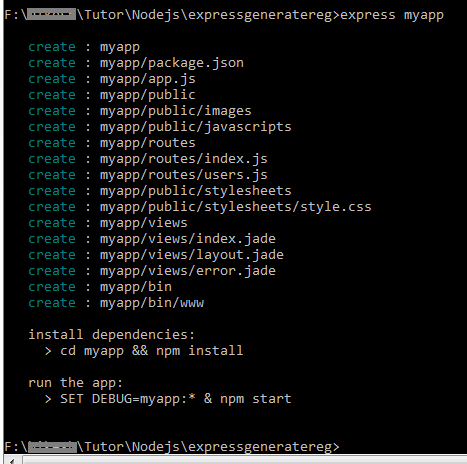
It will create the folder structure and some required files
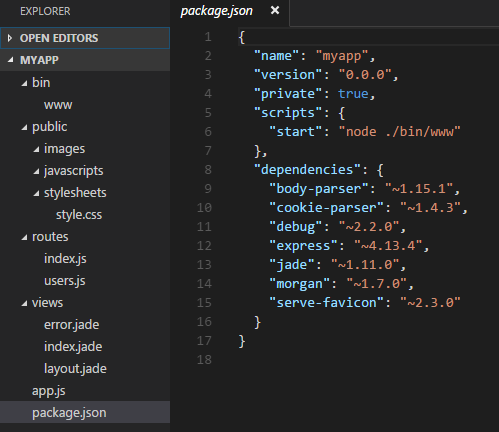
Go inside your app folder and execute npm install
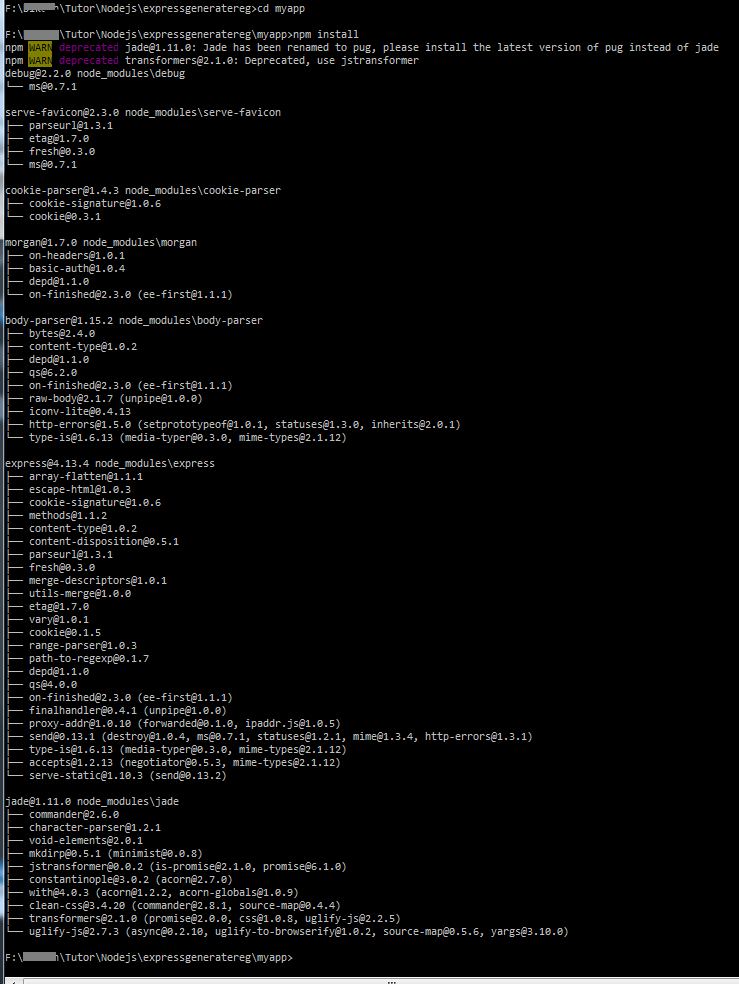
It is ready to start the server
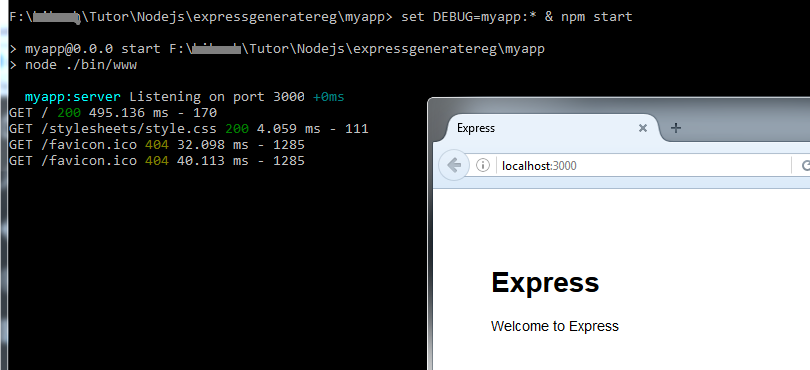
ref : https://expressjs.com/en/starter/generator.html
Click the debugger button located in the left side tool bar

Now you can see the debugger window, Click the setting icon and select Nodejs from the list
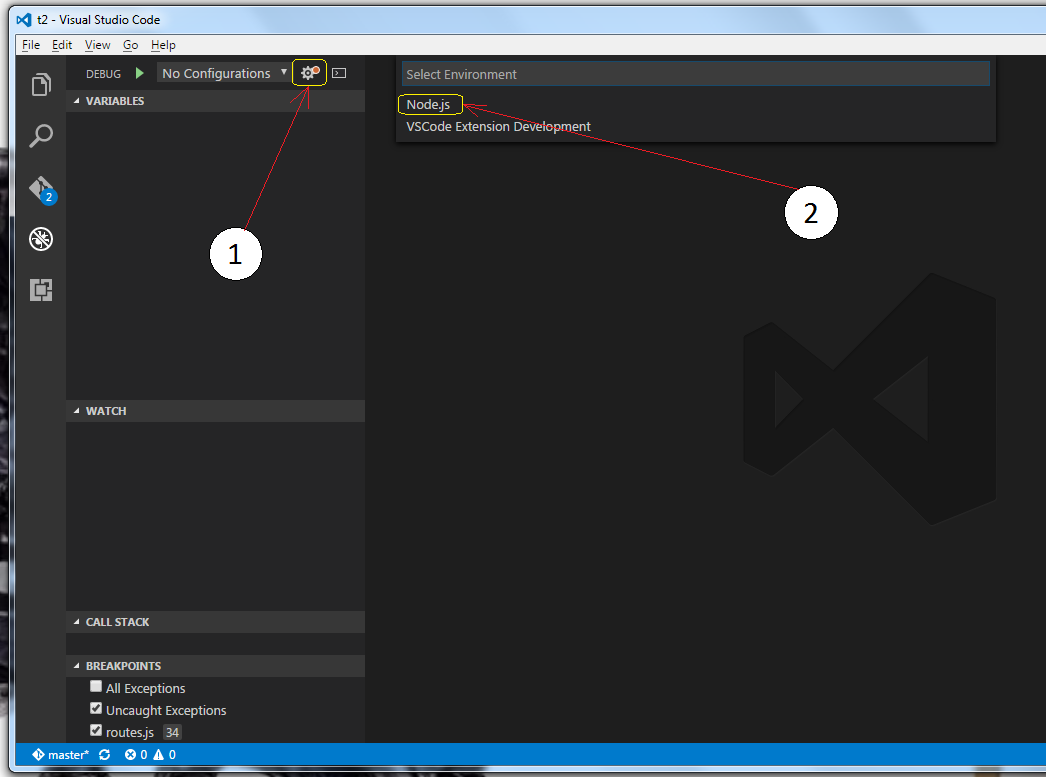
It will open (Create) a launch.json, make sure that the program path locating to your app entry point file ( “program”: “${workspaceRoot}/index.js” ) ( in my case it is index.js in your case may be it is app.js or other). Save the file using Ctrl+S
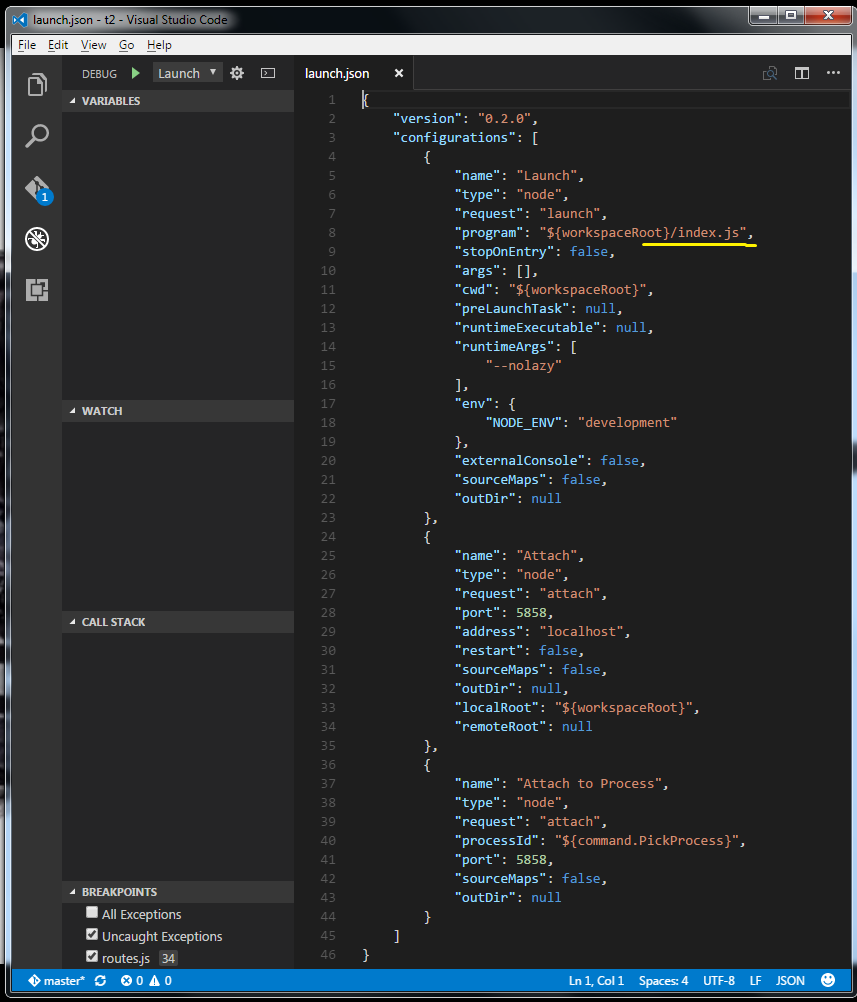
In the bellow screen you can see the automatically created launch configuration file ‘launch.json’
Open your package.js, check the start script is there or not, if it is not there please add it.
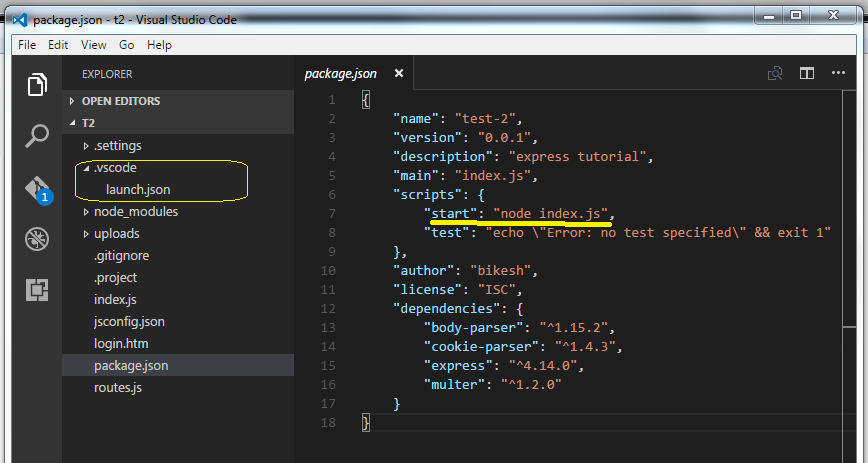
Add break point in your code
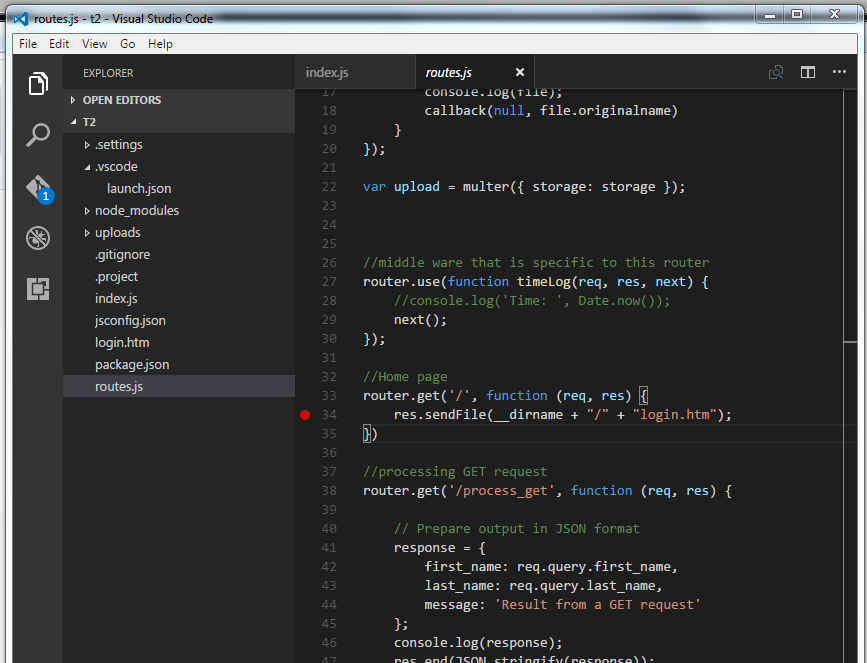
Click the debugging button
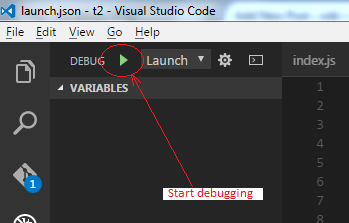
Open your browser and hit the url
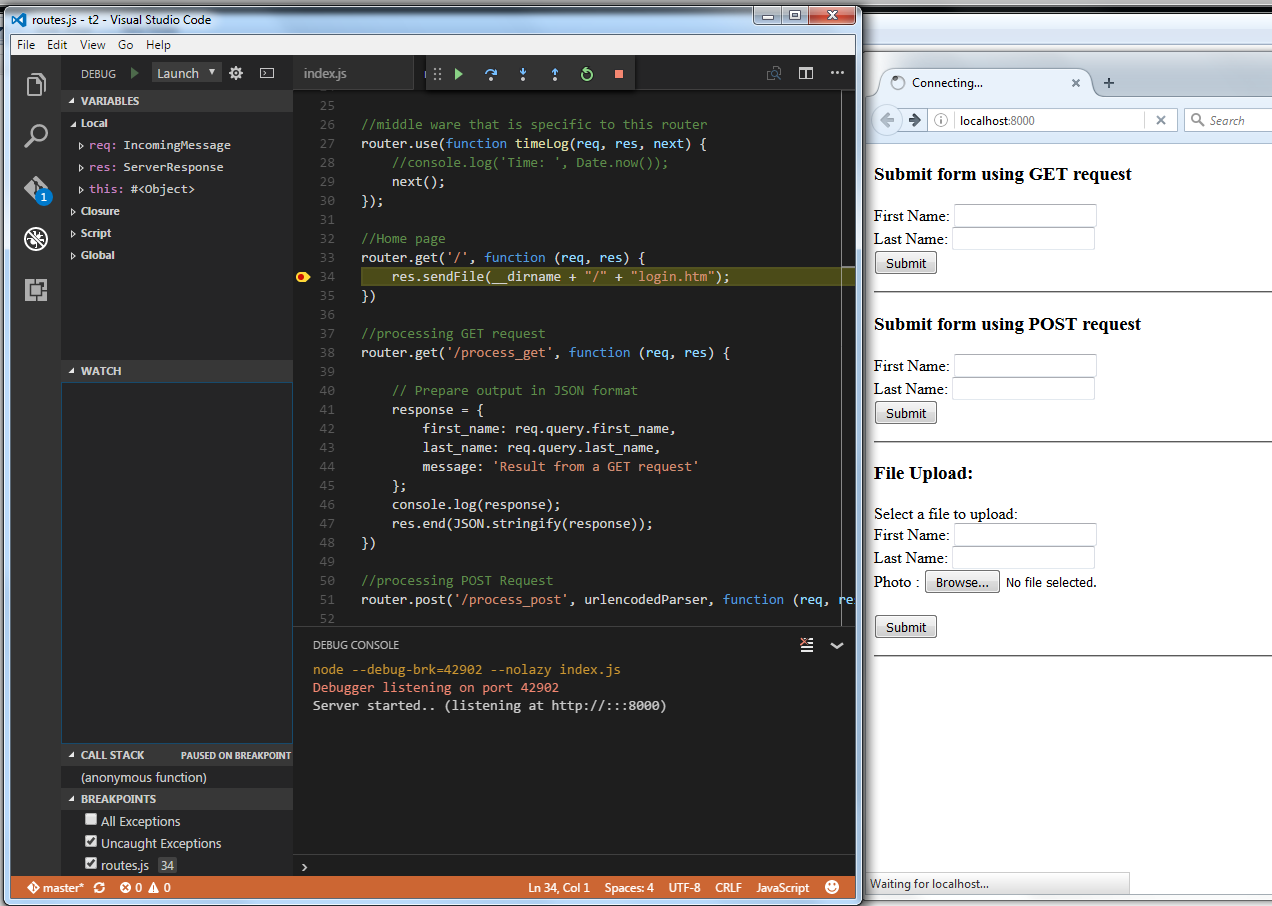
For downloading visual studio code IDE – click here
Create a new with nodejs and express (check this post for how to create node express project)
Pr-requirements
index.js this is my app entry point.
var express = require('express');
var app = express();
app.use(express.static('public'));
//Routes
app.use(require('./routes'));
//app.use("/user",require('./routes')); //http://127.0.0.1:8000/user http://127.0.0.1:8000/user/about
var server = app.listen(8000, function () {
var host = server.address().address
var port = server.address().port
console.log("Server started.. (listening at http://%s:%s)", host, port)
})
routes.js :- I have made a separate rout file that’s why the routs.js file (Check this post for how to make separate rout file) otherwise you can directly add this code into your entry point file (in my case index.js)
I am using the multer node package for handing multipart request
var express = require('express');
var router = express.Router();
var bodyParser = require('body-parser');
// Create application/x-www-form-urlencoded parser
var urlencodedParser = bodyParser.urlencoded({ extended: false })
var multer = require('multer')
var upload = multer({ dest: './uploads/' });
//middle ware that is specific to this router
router.use(function timeLog(req, res, next) {
//console.log('Time: ', Date.now());
next();
});
//Home page
router.get('/', function (req, res) {
res.sendFile(__dirname + "/" + "home.htm");
})
//processing GET request
router.get('/process_get', function (req, res) {
// Prepare output in JSON format
response = {
first_name: req.query.first_name,
last_name: req.query.last_name,
message: 'Result from a GET request'
};
console.log(response);
res.end(JSON.stringify(response));
})
//processing POST Request
router.post('/process_post', urlencodedParser, function (req, res) {
// Prepare output in JSON format
response = {
first_name: req.body.first_name,
last_name: req.body.last_name,
message: 'Result from a POST request'
};
console.log(response);
res.end(JSON.stringify(response));
})
//Multipart request (Accept one file where the name of the form field is named photo)
router.post('/file_upload', upload.single('photo'), function (req, res) {
console.log(req.body) // form fields
//console.log(req.body.first_name)
//console.log(req.body.last_name)
console.log(req.file) // form files
res.status(204).end()
});
module.exports = router;
home.html
<html>
<body>
<div style="width:400px;">
<h3>Submit form using GET request</h3>
<form action="process_get" method="GET">
First Name: <input type="text" name="first_name"> <br />
Last Name: <input type="text" name="last_name"> <br />
<input type="submit" value="Submit">
</form>
<hr />
<h3>Submit form using POST request</h3>
<form action="process_post" method="POST" >
First Name: <input type="text" name="first_name"> <br />
Last Name: <input type="text" name="last_name"> <br />
<input type="submit" value="Submit">
</form>
<hr />
<h3>File Upload:</h3>
Select a file to upload: <br />
<form action="file_upload" method="POST" enctype="multipart/form-data">
First Name: <input type="text" name="first_name"> <br />
Last Name: <input type="text" name="last_name"> <br />
Photo : <input type="file" name="photo" size="50" /> <br /><br />
<input type="submit" value="Submit" />
</form>
<hr />
</div>
</body>
</html>
package.json
{
"name": "sample app",
"version": "0.0.1",
"description": "express get post multipart tutorial",
"main": "index.js",
"scripts": {
"test": "echo \"Error: no test specified\" && exit 1"
},
"author": "bm",
"license": "ISC",
"dependencies": {
"body-parser": "^1.15.2",
"cookie-parser": "^1.4.3",
"express": "^4.14.0",
"multer": "^1.2.0"
}
}
It is ready open your browser and test it
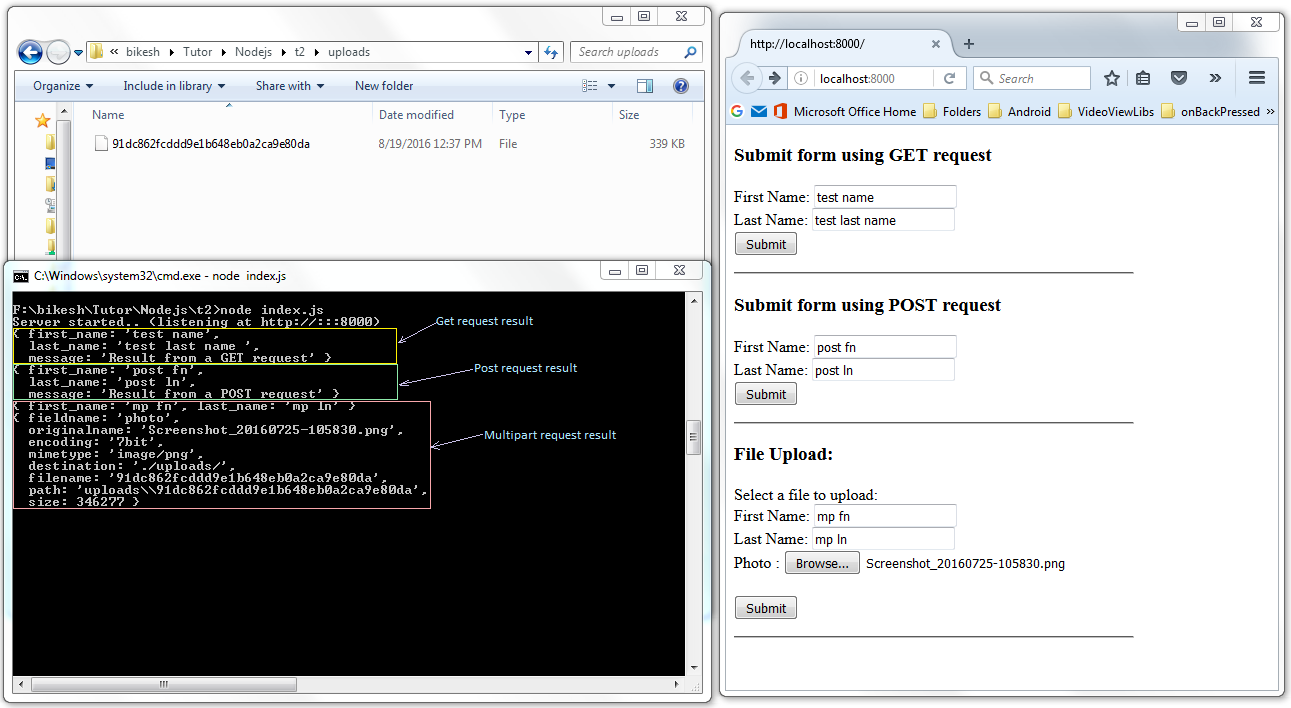
You can see the file is uploaded, but it is using some random name for the file.
For changing file name we can make a small configuration changes in routs.js. Insted of ‘var upload = multer({ dest: ‘./uploads/’ });’ add the new configuration settings
.....
.....
var multer = require('multer')
//var upload = multer({ dest: './uploads/' });
var storage = multer.diskStorage({
destination: function (request, file, callback) {
callback(null, './uploads/');
},
filename: function (request, file, callback) {
console.log(file);
callback(null, file.originalname)
}
});
var upload = multer({ storage: storage });
.....
.....
ref :
https://wiki.workassis.com/installing-express-with-nodejs/
Open index.js (in your case it may be app.js or server.js) and set the request header
var express = require('express');
var app = express();
...
...
//CORS support settings
app.use(function(req, res, next){
res.header('Access-Control-Allow-Origin', '*');
res.header('Access-Control-Allow-Headers', 'Origin, X-Requested-With, Content-Type, Accept');
res.header('Access-Control-Allow-Methods', 'GET,PUT,POST,DELETE');
next();
});
...
....
app.get('/', (req, res) => {
res.sendFile(__dirname + '/index.html');
});
app.use('/api/user', user);
...
Move the rout definition from the index.js or app.js
Folder structure
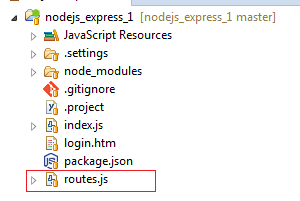
index.js file
var express = require('express');
var app = express();
app.use(express.static('public'));
//Routes
app.use(require('./routes')); //http://127.0.0.1:8000/ http://127.0.0.1:8000/about
//app.use("/user",require('./routes')); //http://127.0.0.1:8000/user http://127.0.0.1:8000/user/about
//you can create more routs
//app.use("/admin",require('./adminroutes')); //http://127.0.0.1:8000/admin http://127.0.0.1:8000/admin/about
var server = app.listen(8000, function () {
var host = server.address().address
var port = server.address().port
console.log("Example app listening at http://%s:%s", host, port)
})
routes.js
var express = require('express');
var router = express.Router();
//Middle ware that is specific to this router
router.use(function timeLog(req, res, next) {
console.log('Time: ', Date.now());
next();
});
// Define the home page route
router.get('/', function(req, res) {
res.send('home page');
});
// Define the about route
router.get('/about', function(req, res) {
res.send('About us');
});
module.exports = router;
you can add more routs like admin routs (*i am not added this in my project so it will not see int the above folder structure)
adminroutes.js
var express = require('express');
var router = express.Router();
//Middle ware that is specific to this router
router.use(function timeLog(req, res, next) {
console.log('Time: ', Date.now());
next();
});
// Define the home page route
router.get('/', function(req, res) {
res.send('Admin dash board');
});
// Define the about route
router.get('/profile', function(req, res) {
res.send('About profile');
});
module.exports = router;